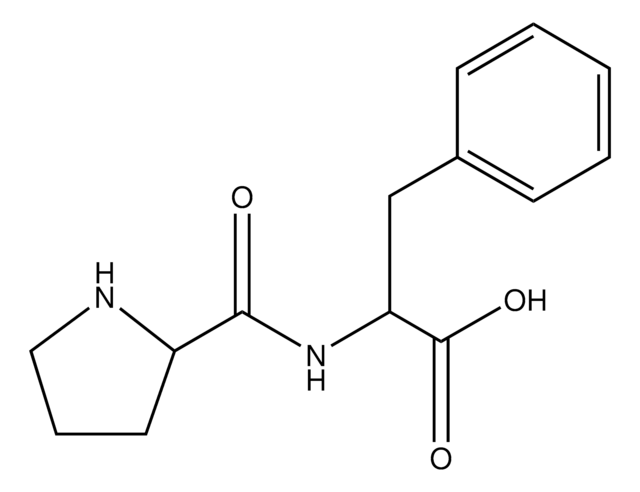L8753
Leu-Pro hydrochloride
≥98%, suitable for ligand binding assays
Iniciar sesiónpara Ver la Fijación de precios por contrato y de la organización
About This Item
Fórmula empírica (notación de Hill):
C11H20N2O3 · HCl
Número de CAS:
Peso molecular:
264.75
MDL number:
UNSPSC Code:
12352202
PubChem Substance ID:
NACRES:
NA.26
Productos recomendados
Nombre del producto
Leu-Pro hydrochloride,
assay
≥98%
Quality Level
form
powder
technique(s)
ligand binding assay: suitable
color
white
storage temp.
−20°C
SMILES string
Cl.CC(C)CC(N)C(=O)N1CCCC1C(O)=O
InChI
1S/C11H20N2O3.ClH/c1-7(2)6-8(12)10(14)13-5-3-4-9(13)11(15)16;/h7-9H,3-6,12H2,1-2H3,(H,15,16);1H
InChI key
GZEPUBCBTCSTKP-UHFFFAOYSA-N
Biochem/physiol Actions
L-leucyl-L-proline (Leu-Pro) and its retro variant Pro-Leu may be used along with other proline dipeptides to study imprinting and chemotaxis in tetrahymena.
Storage Class
11 - Combustible Solids
wgk_germany
WGK 3
flash_point_f
Not applicable
flash_point_c
Not applicable
ppe
Eyeshields, Gloves, type N95 (US)
Elija entre una de las versiones más recientes:
¿Ya tiene este producto?
Encuentre la documentación para los productos que ha comprado recientemente en la Biblioteca de documentos.
Fengxia Zhang et al.
Molecular bioSystems, 6(5), 852-861 (2010-06-23)
A novel metabonomic method based on fast liquid chromatography coupled with ion trap-time of flight mass spectrometry (UFLC/MS-IT-TOF) was applied to study the metabolic changes of plasma and urine in depression and excess fatigue rats. Principal component analysis (PCA) and
L Köhidai et al.
Cell biology international, 21(6), 341-345 (1997-06-01)
Our investigations demonstrate that proline-containing dipeptides can provoke a chemosensory response from the unicellular Tetrahymena pyriformis. The chemotactic effects of the dipeptides have a close relationship with the side chain and the lipophilicity of the amino-terminal amino acid. Comparison of
G Csaba et al.
Bioscience reports, 17(6), 537-542 (1998-04-30)
Proline-glycine, proline-leucine and proline-valine dipeptides and their retro variants were used in the experiments to study the effects of pretreatment (imprinting) in Tetrahymena, by investigating fluorescein isothiocyanate (FITC)-conjugated peptide binding. The protozoan organism could differentiate between the proline-dipeptides containing different
G Schoetz et al.
Electrophoresis, 22(12), 2409-2415 (2001-08-25)
Dynamic capillary electrophoresis (DCE) and computer simulation of the elution profiles with the theoretical plate and the stochastic model has been applied to determine the isomerization barriers of the three dipeptides L-alanyl-L-proline, L-leucyl-L-proline, and L-phenylalanyl-L-proline. The separation of the rotational
Nuestro equipo de científicos tiene experiencia en todas las áreas de investigación: Ciencias de la vida, Ciencia de los materiales, Síntesis química, Cromatografía, Analítica y muchas otras.
Póngase en contacto con el Servicio técnico








